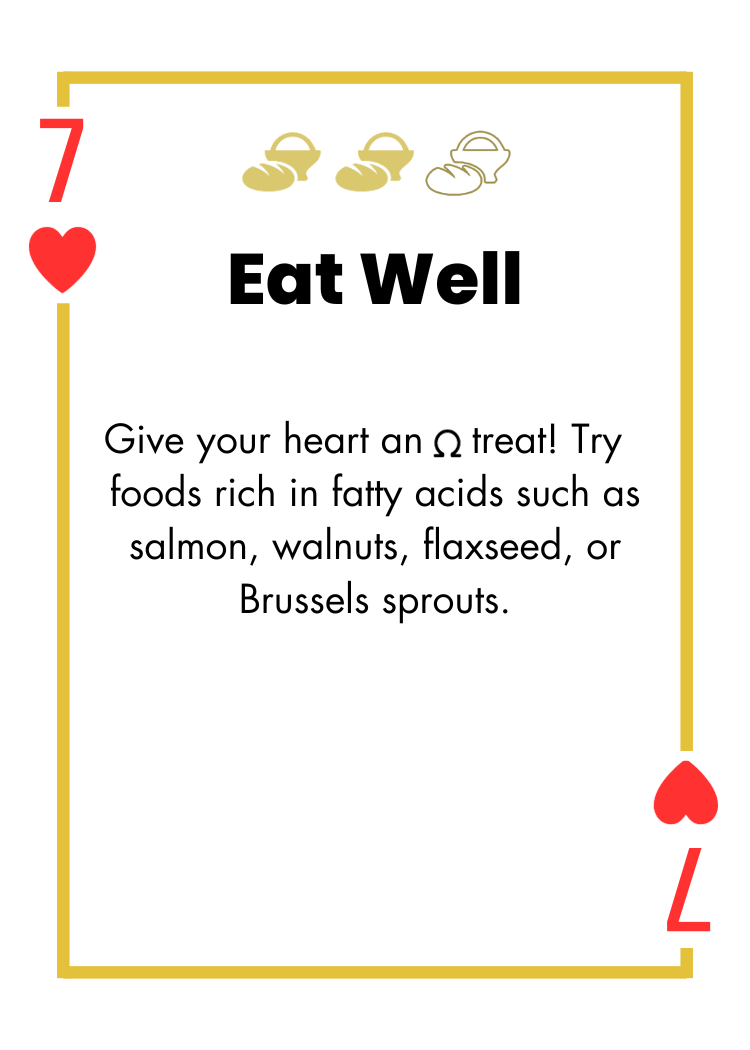7 of Hearts - Omega Treat

Omega-3 fats are a type of polyunsaturated fat present in both animal and plant sources of fat (Williden 2020).
These types of fats are an important nutrient found in foods like salmon and sprouts which the body can’t do without. As well as being good for brain and eye development, Omega-3 fatty acids help lower good cholesterol and maintain a healthy heart.
The richest sources of animal Omega-3 are contained in foods such as salmon, mackerel, sardines, herrings, and grass-raised cattle. These foods contribute both eicosapentaenoic acid (EPA) and docosahexaenoic acid (DHA) omega fatty acids (Williden 2020).
Plant-based sources include avocados, leafy green vegetables, walnuts, flax seeds, and chia seeds. These foods provide alpha-linolenic (ALA) acid and ALA is more common in our everyday diet than EPA and DHA (Williden 2020).
Additionally, Omega 6 fats also play a role in the production of hormones and molecules that regulate inflammatory pathways. Significant sources of omega-6 fats are present in the same plant sources as mentioned above. When Omega-6 fats are combined in the correct dietary ratio with omega-3 fats this helps in lowering inflammation (Williden, 2020).

It’s a good idea to get some expert advice before taking any supplements or changing your diet significantly. Lucky for you our dietitians are on hand to help you out!
Our Heart Health programme focuses on how to keep your heart in tip-top condition through the wellness pillars of nutrition, physical activity, sleep, and mental fitness.
This holistic model of support is the absolute gold standard way to make sustainable behavioural changes that will get you feeling better today, tomorrow, and beyond!
Check out these nutritional tips on how to get good fats:

Fish oils are the most common source of omega-3 fatty acids. There exists a myriad of protective and beneficial effects of these fatty acids which include better heart health, lowered cardiovascular disease risk, healthy blood lipid profile, maternal and child health benefits, the elderly population health benefits and protective effects for type-2 diabetes, inflammatory and renal diseases, central nervous system function, psychiatric disorders, several cancers, and other illnesses (Tur et al., 2012).
Plant omega-3 fatty acids are the main source of ALA. This increases blood DHA and ARA (Arachidonic Acid) levels which improves insulin sensitivity and offers a protective effect on bone metabolism (Tur et al., 2012).
Omega-3 fats are an essential component of our cell membranes and help synthesize brain neurotransmitters and molecules of the immune system. They help with maintaining the elasticity of our arteries. These benefits found when research has investigated omega-3 fat intake indicate they are likely responsible for the reduction of risk for cardiovascular disease, arthritis, neurological disorders, type-2 diabetes, and other inflammatory conditions (Williden, 2020).
DHA is required for the growth & development of the brain and retinas of a fetus during pregnancy. EPA appears to be responsible for helping improve mood disorders (Williden 2020).
Small changes CAN make a big difference – that’s what the 1% club is all about.
4 ways to get good fats infographic. www.heart.org. (n.d.). https://www.heart.org/en/healthy-living/healthy-eating/eat-smart/fats/4-ways-to-get-good-fats-infographic
Tur, J. A., Bibiloni, M. M., Sureda, A., and Pons, A. (2012). Dietary sources of omega 3 fatty acids: public health risks and benefits. British Journal of Nutrition, 107(S2), S23-S52.
Williden, M. (2020, December 22). The Omega Fatty Acids Balancing Act. NZ Herald. https://www.nzherald.co.nz/eatwell/food-news/the-omega-fatty-acids-balancing-act/KM6HRSSG5V7YBRLNDOPH36IRMU/


 See Other Cards!
See Other Cards!